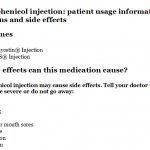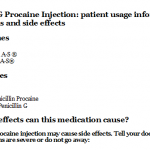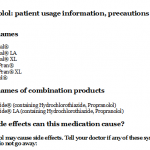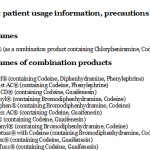
Colestipol: patient usage information, precautions and side effects
Tuesday, May 30, 2017 by Gregory Van Dyke
http://www.naturalnewsreference.com/2017-05-30-colestipol-patient-usage-information-precautions-and-side-effects.html
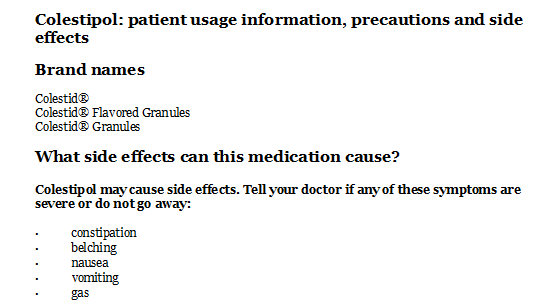
Colestipol: patient usage information, precautions and side effects
Brand names
Colestid®
Colestid® Flavored Granules
Colestid® Granules
What side effects can this medication cause?
Colestipol may cause side effects. Tell your doctor if any of these symptoms are severe or do not go away:
-
constipation
-
belching
-
nausea
-
vomiting
-
gas
If you experience the following symptom, call your doctor immediately:
unusual bleeding (such as bleeding from the gums or rectum)
If you experience a serious side effect, you or your doctor may send a report to the Food and Drug Administration’s (FDA) MedWatch Adverse Event Reporting program online (http://www.fda.gov/Safety/MedWatch) or by phone (1-800-332-1088).
Why is this medication prescribed?
Colestipol is used with diet changes (restriction of cholesterol and fat intake) to reduce the amount of cholesterol and certain fatty substances in your blood. Accumulation of cholesterol and fats along the walls of your arteries (a process known as atherosclerosis) decreases blood flow and, therefore, the oxygen supply to your heart, brain, and other parts of your body. Lowering your blood level of cholesterol and fats may help to prevent heart disease, angina (chest pain), strokes, and heart attacks.
This medication is sometimes prescribed for other uses; ask your doctor or pharmacist for more information.
How should this medicine be used?
Colestipol comes as granules to take by mouth. It usually is taken two to four times a day. Follow the directions on your prescription label carefully, and ask your doctor or pharmacist to explain any part you do not understand. Take colestipol exactly as directed. Do not take more or less of it or take it more often than prescribed by your doctor.
Unless otherwise instructed, take all other medications at least 1 hour before or 4 hours after you take colestipol because colestipol can interfere with their absorption.
Continue to take colestipol even if you feel well. Do not stop taking colestipol without talking to your doctor.
Do not take the granules dry. Add them to at least 3 ounces (90 milliliters) of a liquid (e.g., fruit juice, water, milk, or soft drink) and stir until completely mixed. If you use a carbonated beverage, mix it slowly in a large glass to minimize foaming. After taking the dose, rinse the glass with a small amount of additional liquid and drink it to be sure that you receive the entire dose.
For convenience and to improve taste, mix your entire next-day’s dose in a liquid in the evening and refrigerate it. Colestipol also may be mixed with hot or regular breakfast cereals, thin soups (e.g., tomato and chicken noodle), or pulpy fruit (e.g., crushed pineapple, pears, peaches, and fruit cocktail).
What special precautions should I follow?
Before taking colestipol,
-
tell your doctor and pharmacist if you are allergic to colestipol or any other drugs.
-
tell your doctor and pharmacist what prescription and nonprescription medications you are taking, especially amiodarone (Cordarone), antibiotics, anticoagulants (‘blood thinners’) such as warfarin (Coumadin), digitoxin, digoxin (Lanoxin), diuretics (‘water pills’), iron, loperamide (Imodium), mycophenolate (Cellcept), oral diabetes medications, phenobarbital, phenylbutazone, propranolol (Inderal), thyroid medications, and vitamins.
-
tell your doctor if you have or have ever had unusual bleeding, an underactive thyroid gland, heart or intestinal disease, or if you have hemorrhoids.
-
if you are taking gemfibrozil (Lopid), take it 2 hours before or 2 hours after colestipol.
-
tell your doctor if you are pregnant, plan to become pregnant, or are breast-feeding. If you become pregnant while taking colestipol, call your doctor.
-
What special dietary instructions should I follow?
-
Eat a low-fat, low-cholesterol diet. Be sure to follow all exercise and dietary recommendations made by your doctor or dietitian. You can also visit the National Cholesterol Education Program (NCEP) website for additional dietary information at http://www.nhlbi.nih.gov/health/public/heart/chol/chol_tlc.pdf.
What should I do if I forget a dose?
Take the missed dose as soon as you remember it and take any remaining doses for that day at evenly spaced intervals. Do not take a double dose to make up for a missed one.
What should I know about storage and disposal of this medication?
Keep this medication in the container it came in, tightly closed, and out of reach of children. Store it at room temperature and away from excess heat and moisture (not in the bathroom). Throw away any medication that is outdated or no longer needed. Talk to your pharmacist about the proper disposal of your medication.
In case of emergency/overdose
In case of overdose, call your local poison control center at 1-800-222-1222. If the victim has collapsed or is not breathing, call local emergency services at 911.
What other information should I know?
Keep all appointments with your doctor and the laboratory. Your doctor will order certain lab tests to check your response to colestipol.
Do not let anyone else take your medication. Ask your pharmacist any questions you have about refilling your prescription.
It is important for you to keep a written list of all of the prescription and nonprescription (over-the-counter) medicines you are taking, as well as any products such as vitamins, minerals, or other dietary supplements. You should bring this list with you each time you visit a doctor or if you are admitted to a hospital. It is also important information to carry with you in case of emergencies.
Why is this medication prescribed?
How should this medicine be used?
What special precautions should I follow?
What special dietary instructions should I follow?
What should I do if I forget a dose?
What side effects can this medication cause?
What should I know about storage and disposal of this medication?
Tagged Under: Tags: chemical medicine, medication, Pharma, Prescription Medicine

